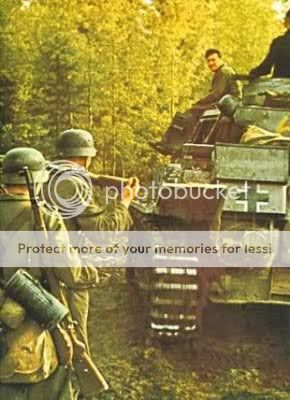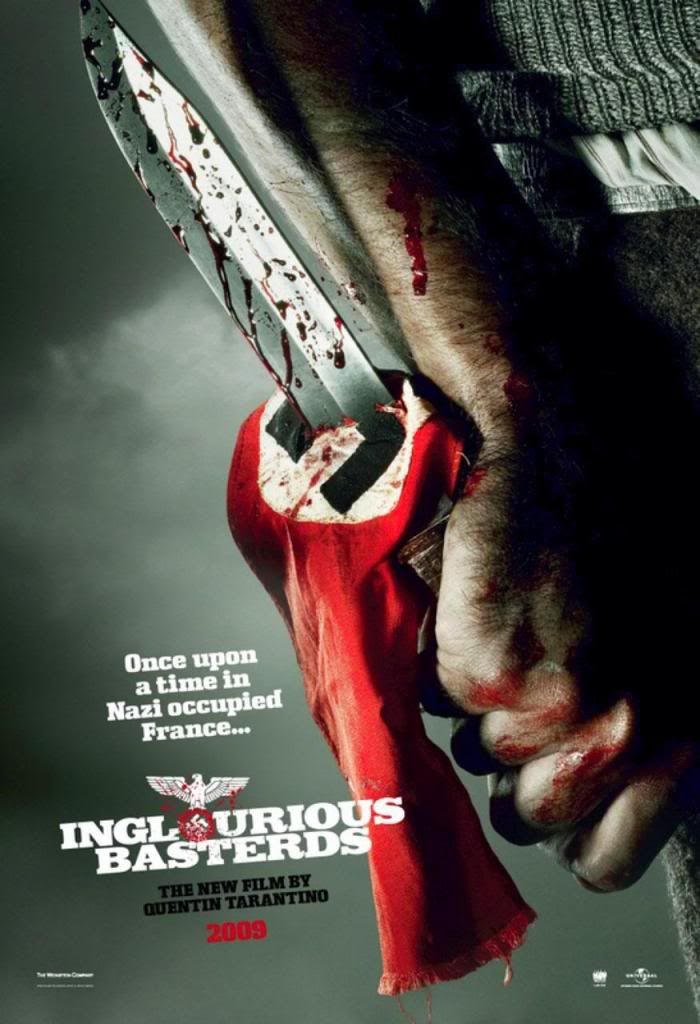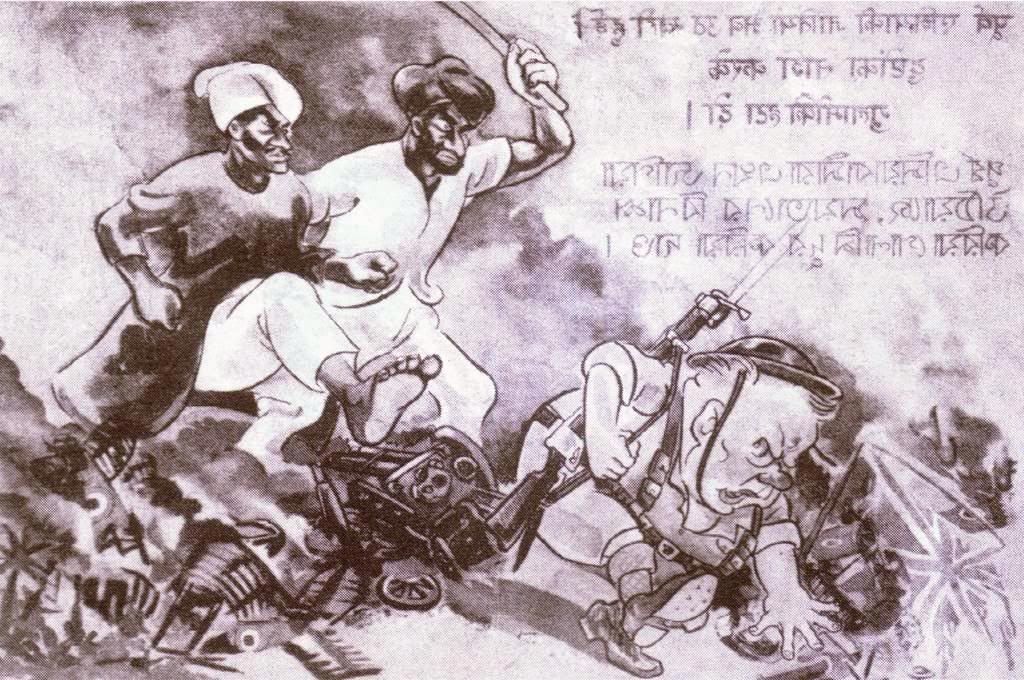Deutsche Fassung
Wersja polska
 War comedies seem to be in a deep crisis. Film-“creators” are flooding the world cinema with ever more degenerated “works” that breathe no “humour” anymore but ever more deviant violence like in the case of the most recent one, the “Talmudic” movie “Inglourious Basterds”. If this is supposed to be “entertainment”, then most likely it is suited to people with exceptionally deviant taste and sadistic inclination…
War comedies seem to be in a deep crisis. Film-“creators” are flooding the world cinema with ever more degenerated “works” that breathe no “humour” anymore but ever more deviant violence like in the case of the most recent one, the “Talmudic” movie “Inglourious Basterds”. If this is supposed to be “entertainment”, then most likely it is suited to people with exceptionally deviant taste and sadistic inclination…
 There have been various cinema creations either directly about the Second World War or on a post-war theme that also relate to the war. There were some real achievements among them (even Achievements, with a capital-A, like “The Great Escape”) yet their number is relatively low. But most have been made in the same, or similar, genre-pattern. What is more, the British even made a movie, “The One That Got Away” (1957), about a German fighter-pilot, Franz von Werra, who succeeded in his flight of escape from British captivity. It was however the only movie of its kind. On the whole, movies of the genre are increasingly boring.
There have been various cinema creations either directly about the Second World War or on a post-war theme that also relate to the war. There were some real achievements among them (even Achievements, with a capital-A, like “The Great Escape”) yet their number is relatively low. But most have been made in the same, or similar, genre-pattern. What is more, the British even made a movie, “The One That Got Away” (1957), about a German fighter-pilot, Franz von Werra, who succeeded in his flight of escape from British captivity. It was however the only movie of its kind. On the whole, movies of the genre are increasingly boring.
In order to agitate some of the sick instincts among the audience, surprising monstrosities have sometimes been invented. Do you remember the movie “A Return to Salem’s Lot” (1987) directed by Larry Cohen? The action is set in a seemingly innocent, quiet town where everyone seems to be friendly. Only later it becomes clear that the inhabitants are terrorized by… vampires. Not just by any vampires – but by Nazi criminals (how else?…). Therefore the main characters of the plot are aided by a Jewish Nazi-hunter who arrives specifically for this purpose. The culminating point of the movie is a scene of the fight against the vampires in the night. In accordance with common mythology, vampires sleep soundly in their coffins during the day for they cannot survive exposure to light. Coffins are therefore indispensable to them. Alas, during the fight scene these coffins catch fire. The vampire-leader tries to rally his unusual flock with a cry: “Protect the coffins!” All in vain! The Jewish agent and our heroes prevail and happiness returns to the township.
surprising monstrosities have sometimes been invented. Do you remember the movie “A Return to Salem’s Lot” (1987) directed by Larry Cohen? The action is set in a seemingly innocent, quiet town where everyone seems to be friendly. Only later it becomes clear that the inhabitants are terrorized by… vampires. Not just by any vampires – but by Nazi criminals (how else?…). Therefore the main characters of the plot are aided by a Jewish Nazi-hunter who arrives specifically for this purpose. The culminating point of the movie is a scene of the fight against the vampires in the night. In accordance with common mythology, vampires sleep soundly in their coffins during the day for they cannot survive exposure to light. Coffins are therefore indispensable to them. Alas, during the fight scene these coffins catch fire. The vampire-leader tries to rally his unusual flock with a cry: “Protect the coffins!” All in vain! The Jewish agent and our heroes prevail and happiness returns to the township.
If filmmakers are drained of new ideas for their war-Nazi horror-movies then perhaps, after having exhausted one pattern with which they make their movies, they could try another one. One pattern that is untouched and in a virgin state: German heroes in uniforms giving their enemies from the “Great Coalition” a good thrashing. Perhaps some SS-Men or Wehrmacht-soldiers, let us say: Three Comrades (Drei Kameraden). They would however not spill whole buckets of blood, nor would they slay anyone in a satanic fashion for our “amusement”. No, they would rather remain on the humorous side.
 Imagine three SS-Men or Wehrmachtsoldaten. Their names are Fritz, Max und Rolf. All three are scrappers, never lacking of a good mood, and always with lots of jokes in stock to produce a storm of laughter from the audience. Their jokes are quite sharp. They are basically decent chaps, a bit “derb aber herzlich” (rough but friendly). They even hum a very popular German song from the era, “Ade Polenland”, asong which was composed shortly after the close of the September Campaign (the first recording was in November 1939) around a Polish folk tune. The song even contains a Polish word “piwo” (i.e. “beer”) and a female Polish name “Janka”. (here you will find both the original German lyrics and their English translation – not quite a correct one, for “Weichselstrand” is translated as “distant land” while it actually means “Vistula beach”…).
Imagine three SS-Men or Wehrmachtsoldaten. Their names are Fritz, Max und Rolf. All three are scrappers, never lacking of a good mood, and always with lots of jokes in stock to produce a storm of laughter from the audience. Their jokes are quite sharp. They are basically decent chaps, a bit “derb aber herzlich” (rough but friendly). They even hum a very popular German song from the era, “Ade Polenland”, asong which was composed shortly after the close of the September Campaign (the first recording was in November 1939) around a Polish folk tune. The song even contains a Polish word “piwo” (i.e. “beer”) and a female Polish name “Janka”. (here you will find both the original German lyrics and their English translation – not quite a correct one, for “Weichselstrand” is translated as “distant land” while it actually means “Vistula beach”…).
One of the trio is from Bavaria, another from Silesia and the third from Friesenland. Initially they are together at the front. Later, they are given individual tasks. A whole series of movies could be made about them, just as with the “Monty Python” movies, “The Pink Panther” movies, or like the Polish series “Four Tankmen and a Dog”.
While at the front – or rather behind enemy lines (whether Soviet or American) they lead the enemy’s generals, colonels or polished, spick-and-span majors by the nose (like in the Polish comedy “Where is the General?”). They do to the Soviets or Americans what the “Four Tankmen” or “The Dirty Dozen” did to the Germans – only with more hilarity, like the Polish actor Wojciech Siemion did. They outsmart whole regiments and companies, roll generals and marshalls (e.g. Eisenhower and Montgomery, perhaps Zhukov too…) in mud and dung, bind them naked to cows’ backs and then drive those cows into liquid manure… The three of them stop an entire battalion of Soviet guard at a river to force it later into a panic flight.
One could even maintain that such a movie is “based on real events”, for it would be possible to combine real and comical accidents from the front with fiction. For example, during the War a certain Upper Silesian was actually awarded the Ritterkreuz (Knight’s Cross) because he and a few comrades, together defending an important post, stopped an advance of Soviet troops who then withdrew. By simply making a lot of noise, perhaps partly out of fear, the Soviets mistook them for an enemy much stronger in numbers and retreated. Later this Upper Silesian was given an “Urlaub” (leave) from the front and in his native Silesian town told his story in broken German. As he had not mastered German well, he inserted some Polish words amongst the German. This could be an excellent role for our Rolf to play. Rolf could be, let us say, from Kőnigshűtte or Ruda. His two Kameraden Fritz und Max could make their own coarse comments, in their two respective dialects, to that linguistically mixed story.

In the second movie Fritz, Max und Rolf could get sent, by SS-Gruppenfűhrer Sepp Dietrich for example, directly to the hearts of enemy powers: Fritz aus Landshut in Bayern to Washington DC, Max aus Friesenland to London, and our Upper Silesian (i.e. “Oberschlesier”) Rolf to Moscow. Through their adventures there they would give their viewers and fans unforgettable impressions. T-shirts with their images would readily become bestsellers, especially in Germany.
And so Fritz would make trouble in Washington, where he would get moved to on one of the recently discovered (authentic!) Japanese submarines that could sail 1.5 times around the globe on just one tank (once again: no joking here, there were such subs indeed). There he would fool Bernard Baruch, Henry Morgenthau, Cordell Hull and kick the somewhat corpulent bums of some of the leading bankers. And he would treat the wheelchair-confined president Roosevelt somewhat in the way that Steve Martin, playing inspector Clouseau in “The Pink Panther”, treated Dreyfus his bed-confined ambitious supervisor. Dreyfus was comically maltreated in his bed which rolled through the hospital corridors, down the staircase and ended up in the River Seine.
In Washington DC there is no River Seine. But there is The Potomac, that also has enough water for Roosevelt to get splashed into – much to Fritz’s and the German audience’s amusement (well, perhaps not only the German audience’s, for the American Natives or Blacks could split their sides with laughter too – and the Middle-Eastern Arabs even more, you could bet).

Max aus Friesenland would get moved on a U-Boat to England where he would slip into the Parliament and to Chartwell, the residence of our beloved ally, Sir Winston Churchill. His gags with the bowler-hat-wearing English gentlemen can be easily imagined – here the German and the traditional English sense of humour could be intertwined. Anthony Eden and Lord Halifax would be the first to fall prey to our brave Max. And Churchill himself would get pushed by him into such a mess that the whole of Europe could split their sides with laughter: he would get his bulldog-like jaw smacked so that his huge cigar would fall down his throat to end up on the other side – in his undies that is. A cigar that is lit can burn your privates, so Sir Winston would have to undress completely in order to grab it – to the amusement of the audience packed with German youth roaring with laughter. Well, again: perhaps not only the German audience. We too, in Poland, “love” Sir Winston very much. Or do we not?

And now it is Rolf’s turn. He, dispatched behind the Soviet lines and disguised as a NKVD-officer, would slip into the Kremlin. Once there, he would beat Mikoyan, Kaganovich and Merkulov black and blue. He would lock Beria up in a cell of the Lubianka prison (perhaps “our” Wanda Wasilewska, the Communist leader, would get her share as well… Let’s hope!). And, so to speak, for “dessert” Rolf would get Stalin. He would throw him around and against the walls of the Kremlin. He would push his face into a toilet pan. He would undress him completely and kick his bum so that Stalin, jumping comically, would try to escape – in vain, of course. Stalin in his flight would climb the Kremlin’s clock tower, hanging from the clock-hand like Harold Lloyd in his pre-war movies. One could assume that the whole of Eastern and Central Europe could convulse with laughter. Well, the Russians probably much less. And the Georgians would most likely explode with wrath – THEIR Stalin!!!
The makers of ever more silly and monotonous war-movies who make their “works” always on the same pattern of genre, can be reminded that another “pattern” still remains to be explored. Perhaps the time has come for it at last?
